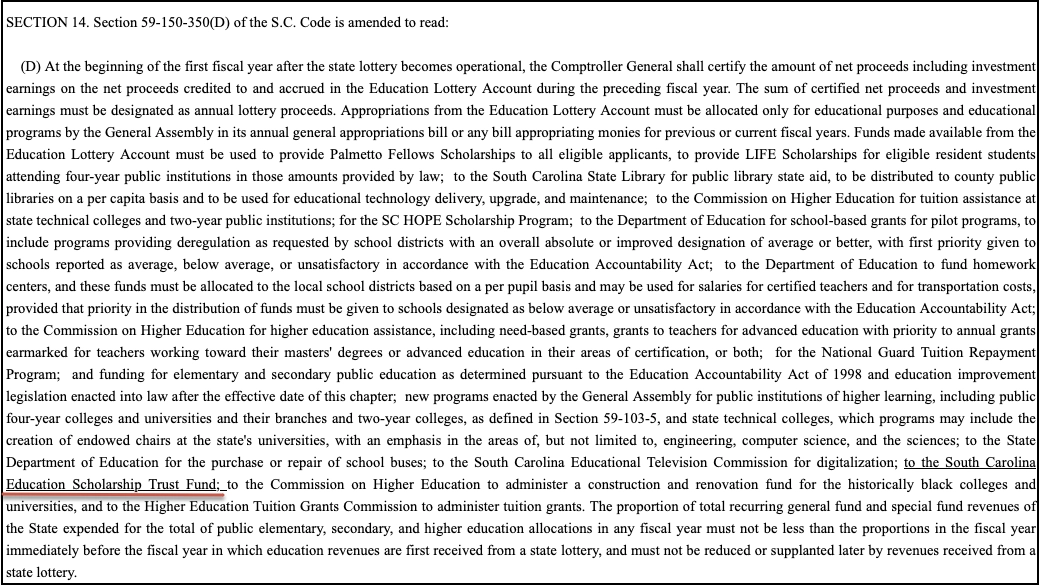Let's talk about what just happened.
The Senate passed its amended version of S.62, the government-run Education Scholarship Trust Fund (ESTF) bill. Most of us know this bill as the "School Choice" bill.
The amended version makes it loud and clear that a dubious effort was made to work around the unconstitutionality of this bill. Tsk, tsk, tsk!
Take a peek at this patchwork.
This bill version added that the ESTF will be funded by not one but two different streams of public money: your tax dollars from the General Fund and public funds from the Education Lottery Account.
Yes, both. And yes, they're both public money.
The General Fund is where your income taxes, sales taxes, property taxes, and other state-collected revenue go. The Education Lottery Account is no different. It's operated by the state, the revenue goes into a state-controlled fund, and the legislature decides where it goes. Just because the money comes through ticket sales doesn't make it any less public. The state runs it, the state owns it, and the state spends it.
This version gives the General Assembly the authority to use either pot of money or both. According to senators, this was intentional. They wanted flexibility in moving money around without having to file another bill if and when this bill is found unconstitutional again.
Flexibility to dodge legal challenges.
Here's how it works.
In Section 59-8-120(A)(1), the bill says the fund will consist of "monies appropriated to the department." That's general fund money, your taxes, allocated by the legislature.
And now, thanks to an amendment slipped into Section 59-150-350(D), the bill adds the ESTF to the list of programs that can also be funded through lottery proceeds.


If using general fund money gets challenged in court, no problem. The general assembly can shift to lottery funds. If lottery funds aren't enough, they'll swing back to general funds. That's what one senator said on the floor; this added funding cushion allows the legislature to move money back and forth without needing to pass another bill.
In other words, they know a lawsuit is coming, and this is their way of preparing for it.
Again, General and Lottery funds are both public funds.
But wait, the bill now states it's not public, so it must not be.
Now, here's where it gets even more ridiculous.
In Section 59-8-120, legislators included this:
"The funds and assets of the South Carolina Education Scholarship Trust Fund are not funds of the State but are instead held in trust..."

Seriously? Is this the part that's supposed to make it constitutional?
These are public dollars, collected and managed by public officials, flowing through a government-controlled program. But because this bill says it's not public, we're supposed to believe it?
Common sense says otherwise. Just because you call something a "trust" doesn't mean it stops being taxpayer-funded. You can't dodge constitutional limits with word games. And yet, that's exactly what this bill tries to do.
And they admitted it. A senator literally said, "We know this is going to be challenged, not a problem with that."
Translation: We know it's probably unconstitutional.
Oh, and remember, there is a Trustee.
The House was concerned this "trustee" thing was all symbolic. So they added a requirement that a third-party trustee be appointed. Not a public agency. Not a state employee.
The Senate liked that change. So now the State Superintendent gets to appoint someone from the outside to manage all this money, and by doing that, the legislature creates another layer of distance between itself and the funds.
Other Senate changes you should know:
The scholarship amount was raised to $7,500 per student.
Income eligibility now goes up to 500% of the federal poverty level.
There's a cap of 15,000 students, but the bill allows that number to grow through the budget—no new law needed.
Administrative costs are capped at 5% (which sounds good until you realize there's no real detail about oversight).
Two enrollment windows were added, one for existing participants and their siblings, and then a general round.
Unused money doesn't roll over for the student. It gets sent back to the lottery account.
So, in short, S.62 still feels unconstitutional, expensive, a redistribution of wealth, more state involvement, and not in line with conservative principles.
What's next?
The Senate amended the House version but then carried it over, so the bill is still in the Senate.
Once they vote, if they pass it, it’ll head back to the House.
If the House agrees? Then it goes to the Governor.
And then? The lawsuits begin.
Paid for with (yep) your money.
South Carolina, we need to ask a serious question.
Why are lawmakers voting for a bill they admit may violate the Constitution?
Why are we okay with public money being funneled into private programs under a new label?
Why are we creating another government program with more tax burdens instead of addressing the failing public schools we already fund?
And it definitely doesn't mean we sit back and let it pass without a fight.
This will set a precedent. One that could be used to justify much more than this program.
At what point is enough enough?
Disclaimer: The views expressed in this article are those of the author and do not constitute legal or professional advice. ConservaTruth assumes no liability for any actions taken based on this content. Read more.

Subscribe to ConservaTruth's Email Newsletter for curated insights on South Carolina's legislative activities and conservative viewpoints, delivered straight to your inbox! With vetted and easy-to-understand information, our newsletter empowers you to become an informed and engaged citizen, actively participating in safeguarding our cherished Constitutional values. Don’t miss out on crucial updates—join our community of informed conservatives today.





Comments